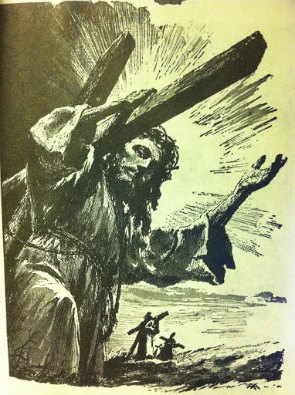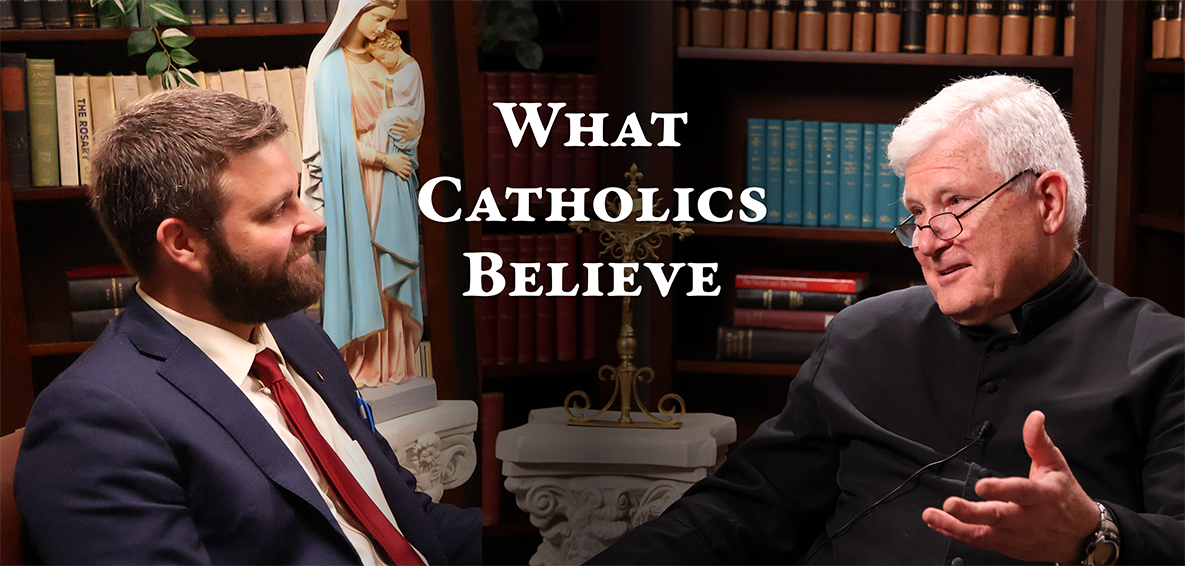Your Place at Calvary

Ask any first grader the question: “Where is God?” “God is everywhere.” is the immediate response. Everywhere! In every nucleus of every atom of every molecule of every galaxy – and in every one of us, God is present in that He knows us perfectly, He loves us greatly and by the power of His Will He created us and sustains our very existence. “The very hairs of your head are numbered.” [St. Luke 12:7] In fact, everything that exists God created to reflect and to manifest and to enjoy in a limited way His Own limitless goodness and perfections and glory as One God, “Who Is” and Who has revealed Himself to be three Divine Persons: Father, Son and Holy Ghost.
As the true Son of God, Our Lord Jesus Christ is one of the Divine Persons in the One Divine Being of God. As God, Jesus is, indeed, everywhere – even as are the Father and the Holy Ghost. But Jesus Christ is God-made-man. He is not God-become-man in the sense that God turned into a man, but rather that God created for Himself -- for His Divine Person -- a human body and soul. As Man, Jesus is not present everywhere. As Man, Jesus Christ is truly God, but His human nature gives Him a human body, human blood, and a human soul. These are situated in place. By the limitless power of God, the Divine Son took human nature for Himself and “dwelt amongst us.” And by the same Divine power he continues right now to make His humanity -- His Body and His Blood and His Soul -- present here on earth.
Having become Man to offer His life as the Sacrifice needed for the salvation of us sinners and, knowing that He was soon to die on the Cross on Calvary, Jesus Christ gave us the miracle that would continue His human presence with us on earth. At His Last Supper with His Apostles, He gave them the command and the power to change mere bread and mere wine into His Own living Body and Blood. And in this miracle, the bread and wine truly do “become” the Body and the Blood of Jesus Christ, in that at the consecration of Mass the bread and wine cease to exist, and “in their place” there becomes present the living Body and Blood and Soul – and Divine Person – of the Son of God. In the Holy Eucharist as a Sacrament, Our Lord remains day and night in the tabernacle, it is true, but that Abiding Presence alone is not the Mass. As the “unbloody Sacrifice of Jesus on the Cross,” the Mass must “show forth the death of the Lord.” [I Corinthians 11: 26] It is the two-fold consecration of the Body and Blood of Jesus Christ which places Them side-by-side upon the altar that shows forth the sacrificial death of Our Savior. Thus, for those few minutes from the consecration until the Communion at Mass, the Sacrifice of Jesus on the Cross becomes present upon the altar of our church.
This is what makes the worship of Catholics so utterly different from every other kind of “worship” mankind has devised to offer to God. The Mass is the worship that God Himself has given us to offer Him, the pure and holy and perfect Sacrifice, the “clean oblation” foretold by the prophet Malachi [1: 11]. This explains why the ceremonies of the Church and the very structure of a Catholic church itself is “oriented” toward a single purpose, a single goal, a single place: the altar with its tabernacle in a place called “the sanctuary” [the holy place] which is set apart from the rest of the church. There in a sense, the Son of God, made Man, perpetuates His life on earth and continues to dwell with us. Upon the altar He renews at ever Mass the sacrificial offering He made once and for all time on the Cross. From there He comes to us – not only once – but as often as we come to receive Him in the splendid act of love called Holy Communion, when in a miraculous way His love for us embraces our love for Him.
Reflecting on this mystery of the Mass, we can see why everything in our church is turned toward the altar, and why the ceremonies are all focused, and all those present are quietly intent, upon one and the same Divine Presence, one and the same Divine action: the Holy Sacrifice in which, for our sakes, Jesus Christ Himself pleads to God the Father for mercy, reveals to us the love of God for us, and appeals to us to accept and respond to His love.

